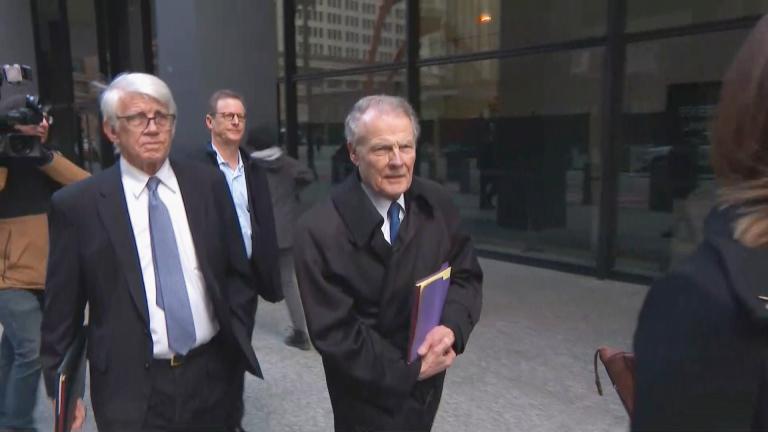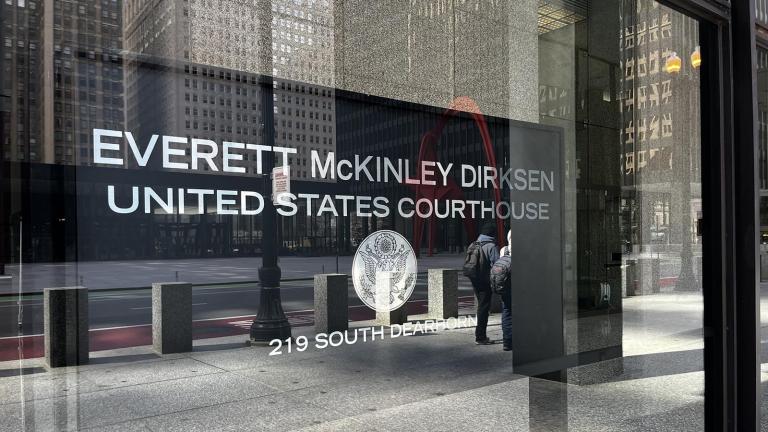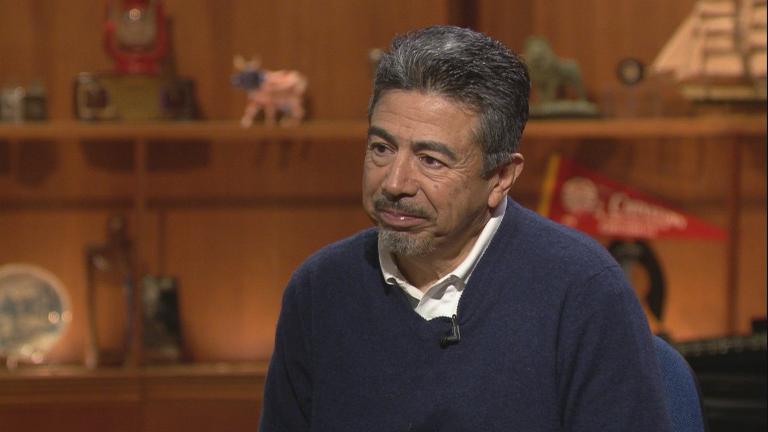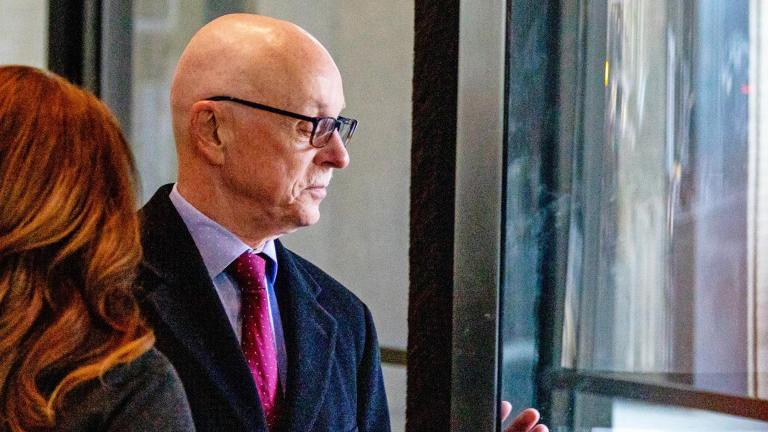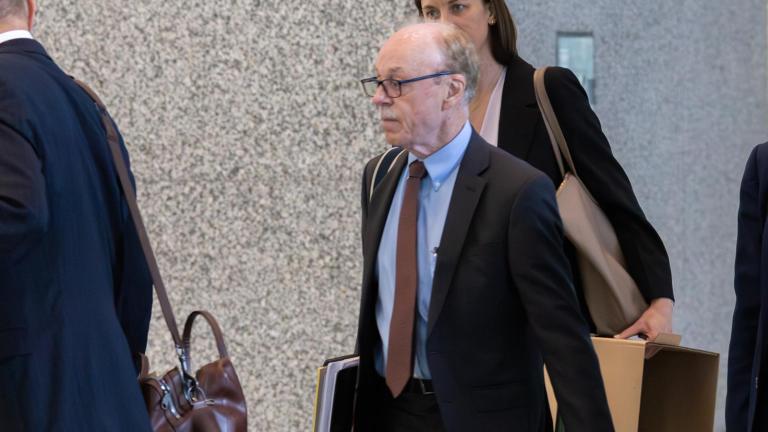Since at least July 2020, when ComEd admitted to a yearslong bribery scheme intended to influence then Illinois House Speaker Michael Madigan, there’s been widespread recognition that the state’s most powerful politician was in federal investigators’ crosshairs.
The U.S. Attorney’s office on Wednesday made their move, indicting Madigan on 22 federal charges, including racketeering, extortion and bribery.
Madigan and his attorneys immediately issued statements vowing to fight the “baseless” charges in court.
Cracks in Madigan’s once vaunted operations surfaced earlier, in 2018, when one of Madigan’s political workers, Alaina Hampton, went public with accusations that Madigan and the Democratic Party of Illinois that he chaired mishandled things when another, well-connected aide sexually harassed her.
“I think my lawsuit actually, may have been the first time that him (Madigan) and his team were caught off guard. Didn’t know how to handle the situation, and perhaps didn’t know how to handle the level of evidence that was brought forward in paper form, in writing,” Hampton said Thursday.
The Democratic Party of Illinois and Hampton reached a settlement in late 2019.
During her time working for the party, Hampton said she often saw Madigan. He was all business, always working, and also always polite.
But she said she also witnessed what she now recognizes as “unethical behavior” within the operation, like an unwritten rule that government employees must also do political work, for free.
Hampton said she “volunteered” between 25 to 40 hours a week.
When she went public with her sexual harassment claims, it was hard – former colleagues refuse to talk to her; some still won’t.
“I think at first they were afraid, and I understand that fear because I worked in that organization, I understand the fearmongering,” Hampton said. “But when I was the person seeking justice it was really hard to be that isolated and to not be supported by Democratic elected officials. The Democratic Party is supposed to be the party of the people. Those elected officials shouldn’t haven’t even hesitated to have my back in that scenario.”
Hampton said in time, there has been a shift. (She’s now working on Cook County Assessor Fritz Kaegi’s campaign).
Hampton said she believes her case opened the door for others to speak out against Madigan.
“It just seems like a movie sometimes, that I’m living in a movie. That it’s not my real life. But it is my real life,” Hampton said. “I do think that my willingness to be outspoken about what was going on in the organization cleared a little bit of a path for some legislators to have more courage to speak up about other things that were happening.”
In January 2021, 19 sitting House Democrats sunk Madigan’s bid for another term as speaker by refusing to vote for him.
State Rep. Terra Costa Howard, D-Glen Ellyn, was the first to publicly distance herself from Madigan, when in July 2020 she called on him to step down in light of the ComEd scandal.
“I had to anticipate what (the) ramifications would be. Somebody isn’t the speaker of the House for 40 years and not accumulate some power obviously. So, I knew that there would be pushback,” she said. “If we were unsuccessful, in the sense, he stayed, I knew there would be ramifications of my bills, my projects.”
But the ramifications were different than she’s anticipated.
“They came from people that I thought I knew … friends. People that I thought would get it. And they didn’t,” Costa Howard said. “It was a lot of harder, in ways that I hadn’t anticipated.”
Madigan’s indictment Wednesday proved emotional.
“It was like having to relive that trauma, and I do call it trauma. It was very, very difficult. You did not know what was going to happen. You didn’t know if you were being followed, if there were people watching you,” Costa Howard said. “It all came flooding back.”
It’s similar for state Rep. Stephanie Kifowit, D-Aurora, who last October announced she was running for speaker, “to give representatives a choice. Him or me. Because there’d never been a choice before.”
“It was very stressful, considering who Mike Madigan was,” Kifowit said. “You have the reputation of Mike Madigan. “
Some legislators, those loyal to Madigan, to this day won’t return her calls, Kifowit said.
Some viewed her bid as selfish.
Hampton credits state Rep. Kelly Cassidy, D-Chicago, for standing up for her when few others would.
Cassidy last year was also part of “The 19” who foiled Madigan’s run for speaker, a position he’d then held all but two years since 1983.
“We knew that our chamber, our state and our party deserved better leadership and the unfolding corruption scandal would only continue to erode public confidence in our work,” Cassidy said.
Had they failed, had Madigan still been serving as speaker when the indictment came down, Cassidy said the legislature would have plunged to chaos, there would be a “complete lack of any forward motion of any of the issues that we’re working on.”
Cassidy, Costa Howard and Kifowit said there has been change since Madigan resigned his House seat in February 2021.
Among those changes, Illinois has its first Black speaker of the House: Emanuel “Chris” Welch.
Welch was not among those who worked to oust Madigan and praised Madigan’s leadership in his first speech as speaker.
“As is evident by this federal indictment, the full weight of the justice system was needed to ensure all charges are investigated properly and thoroughly,” Welch said Wednesday in a statement. “At my direction, the Office of the Speaker has fully cooperated with the investigation and will continue to do so.”
Former House Majority Leader Barbara Flynn Currie said that if the allegations against Madigan are true, there will be a price to pay.
“I find it hard to swallow that ordinary things like giving people job recommendations has suddenly become a federal crime,” she said. “In my experience he’s been a man of integrity.”
Madigan in his statement likewise accused prosecutors of “attempting to criminalize a routine constituent service: job recommendations.”
“Throughout my 50 years as a public servant, I worked to address the needs of my constituents, always keeping in mind the high standards required and the trust the public placed in me,” Madigan said. “I adamantly deny these accusations and look back proudly on my time as an elected official, serving the people of Illinois.”
While many may not openly say-so given Madigan’s legal troubles, many Democrats credit him with guiding the party to dominating every branch of Illinois government, and for fending off anti-labor proposals former Gov. Bruce Rauner attempted to advance.
Follow Amanda Vinicky on Twitter: @AmandaVinicky

